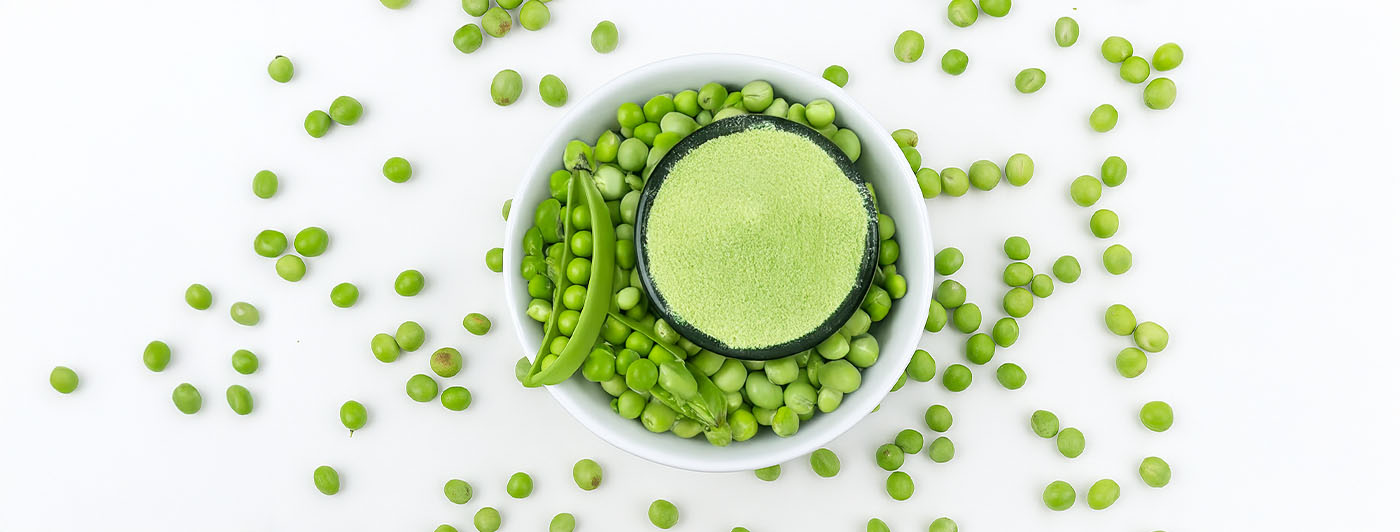Think all plant proteins are incomplete? Think again. In the ever-evolving world of nutrition, myths often outlast facts—and one of the most common is that plant-based proteins can't match their animal-based counterparts. As more people turn to cleaner, ethical, and allergy-friendly food options, pea protein is quietly taking center stage among the top plant protein choices available today.
In today’s world of growing nutritional awareness, plant-based protein sources are gaining momentum. Among them, pea protein has become particularly popular for its clean profile, high digestibility, and impressive nutritional value. But the question remains: Is pea protein a complete protein? Let’s explore its amino acid composition, nutritional benefits, and how it fits into a balanced diet for people pursuing fitness, general well-being, or ethical nutrition choices.
What Is Pea Protein and Why Are So Many Turning to It?
Pea protein is extracted from yellow split peas—a legume that’s naturally rich in protein and fiber. It's not to be confused with green peas or sweet peas, which are more commonly seen on dinner plates. The protein extraction process typically involves drying and grounding peas into a fine flour, separating the starch and fiber, and isolating the protein.

What sets pea protein apart is its digestibility and hypoallergenic nature. Unlike dairy-based proteins, pea protein contains no lactose, making it an excellent alternative for those who are lactose intolerant or sensitive to dairy. Additionally, it's free from soy, gluten, and common allergens, which broadens its appeal across diverse dietary preferences.
From gym-goers to people simply trying to add cleaner, more nutrient-dense foods into their meals, pea protein checks many important boxes. It’s a valuable staple not just in vegan or vegetarian diets, but for anyone seeking better food choices.
Is Pea Protein Complete? Let’s Talk Amino Acids
A “complete protein” refers to one that contains all nine essential amino acids in adequate amounts. These include:
-
Histidine
-
Isoleucine
-
Leucine
-
Lysine
-
Methionine
-
Phenylalanine
-
Threonine
-
Tryptophan
-
Valine
Pea protein contains all nine of these essential amino acids. However, its methionine content is slightly lower compared to animal-based proteins like whey or eggs. Does this make it ineffective? Absolutely not. This minor shortfall is easy to overcome through thoughtful food pairing.
For instance, when pea protein is combined with grains like brown rice or other legumes like kala chana protein per 100g, which is higher in methionine, the combined meal offers a complete amino acid profile. This approach mimics the natural diversity found in traditional diets across cultures—lentils and rice, hummus and pita, beans and corn tortillas.
So yes, pea protein is functionally complete when part of a balanced, varied diet, especially one focused on whole plant foods.
Why Athletes and Everyday Users Are Embracing Pea Protein
The amino acid profile of pea protein is particularly rich in BCAAs (branched-chain amino acids)—leucine, isoleucine, and valine. These are crucial for muscle repair, recovery, and growth. In fact, several studies suggest that pea protein supports muscle thickness and strength gains comparable to whey protein.
But what’s often overlooked is how pea protein also contributes to overall wellness beyond the gym:
-
Satiety and weight control: Protein-rich diets increase feelings of fullness, which may reduce unnecessary snacking and calorie intake. This makes pea protein a subtle ally for those exploring how to reduce face fat or manage body composition.
-
Heart-friendly and gut-friendly: Being free from cholesterol and rich in fiber, especially when combined with very high fiber foods, pea protein supports cardiovascular and digestive health.
-
Iron content: For vegetarians and vegans, getting enough iron is a concern. Pea protein offers non-heme iron that can help meet daily needs, especially when paired with iron rich foods vegetarian sources like spinach, pumpkin seeds, and citrus fruits (which enhance iron absorption).
How Pea Protein Fits Into a Typical Indian Diet
Indian meals often revolve around carbohydrates—rice, chapatis, or dosas. A typical 1 roti nutrition offers around 2–3 grams of protein, which is relatively low compared to the demands of modern, active lifestyles. Adding pea protein to a smoothie or shake post-meal is a simple, non-intrusive way to elevate your daily protein intake without completely overhauling your food preferences.
Moreover, many traditional Indian ingredients pair well with pea protein. For example, mixing it into a lentil soup or adding a scoop into whole wheat pancake batter enriches your meal both in taste and nutrition.
Pea Protein vs Other Plant Proteins: What Makes It Unique?
There are numerous plant protein options in the market—soy, rice, hemp, and even seed-based proteins. However, pea protein stands out due to its:
-
Mild, neutral taste (no bean-like aftertaste)
-
Smooth texture that blends easily in liquids
-
Low allergenicity, making it suitable for nearly everyone
-
Sustainability—peas require less water and fertilizer compared to other crops
It’s a cornerstone of many plant based protein powder formulations today, striking the right balance between performance and practicality. Even people new to supplements often find pea protein to be one of the best choices as a protein powder for beginners.
If you're looking for the best plant based protein to support muscle recovery, gut health, and long-term sustainability, pea protein often comes out ahead in versatility and user experience.
Pea Protein: High Bioavailability Meets Gut-Friendly Fiber
When evaluating any protein source, it’s essential to look beyond just the grams per scoop. What truly matters is bioavailability—how effectively your body can digest, absorb, and utilize the protein. Pea protein scores high on this front, with a digestibility rate exceeding 90%, meaning the majority of what you consume is put to work in muscle repair, immune support, and cellular function.
Unlike many animal-based proteins, pea protein also offers a gut-health advantage. As a legume-derived protein, it carries natural prebiotic properties, which support the growth of beneficial gut bacteria. While some commercial formulations isolate the protein, advanced blends retain portions of the natural fiber content—making them particularly helpful for satiety, metabolic function, and smoother digestion.
Additionally, pea protein’s naturally low glycemic index helps stabilize blood sugar levels and control cravings, which is beneficial not only for energy balance but also for those working toward body composition goals like fat reduction. When consumed with very high fiber foods, it amplifies digestive benefits, supports a healthy gut-brain connection, and may even promote clearer skin and improved mood over time.
Together, high bioavailability and gut-friendly fiber make pea protein an all-around winner for those seeking effective, daily nutrition with added functional benefits.
Combining Pea Protein With Other Vegan Protein Sources
To create a well-rounded protein intake, nutritionists recommend complementing pea protein with other vegan protein sources throughout the day. A diverse mix of lentils, chickpeas, quinoa, and whole grains ensures your body gets not only all amino acids but also a range of antioxidants, micronutrients, and enzymes that promote cellular health.
For example, a meal containing kala chana protein per 100g (which is high in lysine and methionine) alongside pea protein forms a powerful combo for building lean muscle and supporting immunity.
Who Should Consider Pea Protein?
-
Fitness Enthusiasts: Looking to build or maintain lean muscle without bloating or allergens.
-
Busy Professionals: Who need quick, high-protein meals without fuss.
-
New Dieters: Especially those just starting with plant-based lifestyles or looking for protein powder for beginners.
-
Health-Conscious Individuals: Those seeking nutrient-dense, ethical, and sustainable nutrition sources.
Final Take: Is Pea Protein Worth It?
Yes, pea protein is a complete protein—providing all nine essential amino acids your body needs, including high levels of BCAAs and lysine that support muscle repair, energy, and overall wellness. Its amino acid profile is well-rounded and effective, especially when incorporated into a varied, plant-forward diet.
What makes pea protein truly stand out is its high digestibility, clean sourcing, and allergen-free nature. It’s not just suitable for vegans or those with dietary restrictions—it’s ideal for anyone seeking a smarter, more functional approach to daily nutrition.
If you care about what goes into your body—and how it impacts the planet—pea protein is more than a trend.
It’s a modern, complete, and reliable protein choice for clean, conscious living.
Make the switch to better plant protein—start fueling with pea protein today.
Frequently Asked Questions
1. Are pea proteins good for you?
Yes, pea proteins are good for you. They are a high-quality plant-based protein source that contains all nine essential amino acids, making them a complete protein. Pea protein is also easily digestible, low in allergens (free from dairy, soy, and gluten), and rich in iron and branched-chain amino acids (BCAAs), which support muscle recovery, heart health, and satiety. It’s an excellent choice for vegans, vegetarians, and those with food sensitivities.
2. What are the side effects of taking pea protein?
Pea protein is generally well-tolerated, but in rare cases, some individuals may experience mild bloating, gas, or digestive discomfort, especially when consuming large amounts. These side effects are usually due to fiber or sensitivity to legumes. Choosing a high-quality, well-filtered pea protein isolate can reduce the risk of digestive issues. Always start with a moderate serving and consult a healthcare provider if you have concerns.
3. Which is better, pea or whey protein?
Both pea and whey protein are excellent sources of protein, but the better choice depends on your individual needs. Whey protein has a slightly faster absorption rate and is rich in all essential amino acids, particularly leucine. However, pea protein is also complete, easier to digest for many people, and free from dairy and common allergens. For those following a plant-based, lactose-free, or allergen-conscious diet, pea protein is the better option.
4. Is pea protein safe for the kidneys?
Yes, pea protein is safe for healthy kidneys when consumed in recommended amounts. It is a clean, plant-based protein source that does not place excessive strain on the kidneys. However, individuals with existing kidney conditions should monitor their protein intake (including from pea protein) and consult their healthcare provider, as total protein load—not the source—is what matters in such cases.
5. Can pea protein cause weight gain?
Pea protein itself does not cause weight gain unless it contributes to a calorie surplus in your daily diet. It is often used to support weight management, as it promotes satiety and helps preserve lean muscle mass. When used as part of a balanced, calorie-conscious meal plan, pea protein can actually aid in fat loss and healthy body composition.












